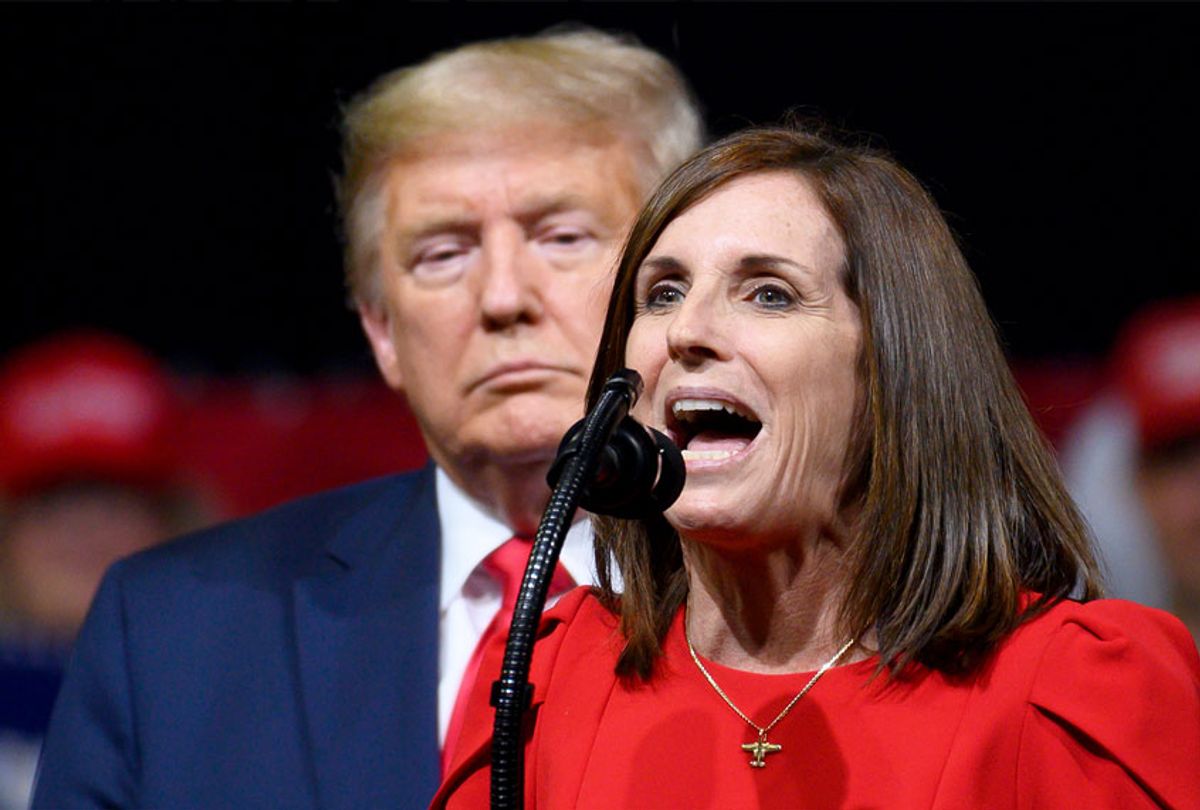Sen. Martha McSally, R-Ariz., suggested on Sunday that residents of Washington, D.C., and Puerto Rico should continue to be denied full rights because giving them statehood would put Republicans at an electoral disadvantage.
McSally lamented in an interview with NBC News that Democrats may vote to grant statehood to Puerto Rico and the District of Columbia if they win control of both chambers of Congress and the White House this November. Presumptive Democratic nominee Joe Biden and most House Democrats do support statehood for D.C., but there is no broad current support for Puerto Rico statehood, largely because residents of the island are divided on the question. Within recent memory, Puerto Rico statehood was backed by both major parties and even included in the Republican platform.
"There's so much at stake here. They're gonna make D.C. and Puerto Rico a state and get four new Democratic senators," McSally said. "We'd never get the Senate back again. And look, this is just the implications of this seat, the implications of this vote."
.@MarthaMcSally asserts this as a repercussion of a Democratic Senate:
"They're going to make D.C. & Puerto Rico a state & get 4 new Democrat Senators. We'd never get the Senate back again. And look, this is just the implications of this seat, the implications of this vote." pic.twitter.com/9TImijula7
— Vaughn Hillyard (@VaughnHillyard) August 11, 2020
Washington, D.C., is home to more than 700,000 people, which is more than Vermont and Wyoming and roughly equal to Alaska. Puerto Rico, which has a Republican governor and a Republican nonvoting representative in Congress, has a population of about 3.2 million, which is larger than 20 states.
The Democratic-led House of Representatives voted earlier this year to grant statehood to the District of Columbia, but the bill was roundly rejected by the Republican-led Senate. There have been no recent efforts in Congress to pass a Puerto Rico statehood bill. In 2017, about 97% of voters in Puerto Rico cast a ballot in favor of statehood, although that is deceptive: Many who opposed statehood boycotted the vote.
McSally, who is one of the most vulnerable Republican Senate incumbents heading into November, has consistently trailed retired astronaut Mark Kelly, the husband of former Rep. Gabby Giffords, D-Ariz., in both opinion polls and fundraising. McSally was appointed to the seat formerly held by the late Sen. John McCain, R-Ariz., after losing a close race to Sen. Kyrsten Sinema in 2018.
Her opposition to granting nearly 4 million Americans full representation in Congress and a say in their government echoes President Trump's comments dismissing the idea because residents of the disenfranchised communities may not support his political party.
"D.C. will never be a state," Trump declared in June. "You mean District of Columbia, a state? Why? So we can have two more Democratic — Democrat senators and five more congressmen? No thank you. That'll never happen."
In fact, D.C. would get just one representative in the House, not five.
Senate Majority Leader Mitch McConnell, R-Ky., similarly complained that granting statehood to D.C. and Puerto Rico would give each "two more new Democratic senators," even though Puerto Rico is currently represented in Congress by a Republican.
"This is full-bore socialism on the march in the House," he said ahead of the House vote. "And yeah, as long as I'm the majority leader of the Senate, none of that stuff is going anywhere."
Rep. Pramila Jayapal, D-Wash., who co-sponsored the D.C. statehood bill, said the issue was a matter of racial justice, noting that nearly half of the city's residents are Black.
"Make no mistake: one of the many ways our country has silenced Black voices and suppressed Black votes has been by preventing D.C. statehood," she said. "D.C. should be a state with two senators and full representation in the House. Congress must act now."
Sen. Tom Carper, D-Del., who sponsored a similar bill in the Senate, called it an "issue of fairness."
"Think about paying taxes to the federal government and then not having a vote to help determine how that government functions," he said. "Imagine the military being sent to your communities to patrol your neighborhoods without approval from the leaders you elect to represent you. That is the current reality for the more than 700,000 Americans living in the District of Columbia."
Puerto Rico's Republican Gov. Wanda Vázquez, who supports statehood, announced in May that the island will hold another referendum on the issue in November, the sixth such vote since 1967 and the third since 2012. The issue used to be bipartisan, with both George W. Bush and Barack Obama saying they would support statehood if the island's residents so chose. Support for statehood was even included in the GOP platform.
Since then, Puerto Rico has been hit hard by hurricane devastation and the coronavirus pandemic, making the need for additional federal support it would get as a state more urgent. When the island was hit by Hurricane Maria roughly around the same time as Hurricane Harvey hit the Houston area, the Trump administration approved far more aid for those impacted in Texas.
"It's true that enfranchising D.C. and Puerto Rico through statehood would likely benefit Democrats electorally (although it's not at all clear that Puerto Rico would be a blue state)," historian Nicole Hemmer, a research scholar with the Obama Presidency Oral History project at Columbia University, wrote in a CNN op-ed. "But that's not an argument against statehood. American citizens have the right to equal representation. The solution is not to stop Democratic voters from exercising their right to vote — that's both immoral and undemocratic. The solution is to win them over. If the Republican Party can't do that, then it doesn't deserve to be in power."

Shares